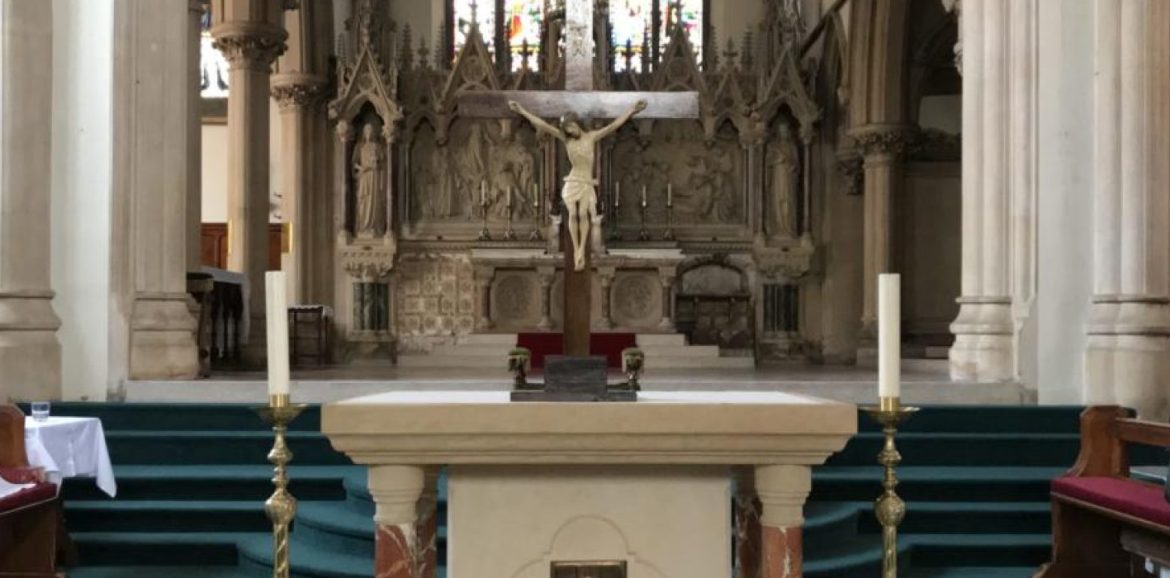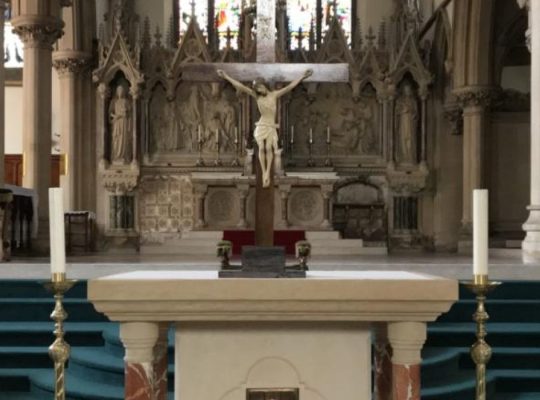Christians readily speak of the New Testament, (which centers on the life and teachings of Christ), as the New Covenant. This expression is found only once in the part of the Bible we call the Old Testament, in the passage from the Book of Jeremiah read today.
Afterwards, Ezekiel, then the anonymous prophets of the Exile or the period immediately following, spoke of an eternal covenant, probably from the perspective of this text from Jeremiah. Moreover, it is the longest quotation from the Old Testament found in the New: the Letter to the Hebrews quotes it in its entirety (8:8-11). Paul considers himself a ‘minister of a new covenant.’ Finally, every time the Eucharist is celebrated, we hear the words pronounced by Jesus himself at the Last Supper, as reported by Luke and Paul, and summed up in the Eucharistic prayer: ‘This is the cup of my blood, the blood of the new and everlasting covenant…..’
It is henceforth impossible for us to read apart from these perspectives the text from Jeremiah offered to us today, on this Fifth Sunday of Lent. What is more, we are seriously challenged by it to know what we read and what we must be as Christians.
A covenant is an agreement, made between God and man., As we know, God can never break his promise (covenant), because he is all truth, but man unfortunately breaks his promises time and again, and so God has to look for other ways to reconcile man to himself after the Fall. What can man offer to God, which he himself has not already created, what can appease God’s justice? Man can give nothing to God, except, perhaps his faithfulness, but we have seen man’s unfaithfulness throughout history, almost as if man is incapable of faithfulness. So today, God announces a New Covenant, and one which will not be broken. ‘I will be their God; they my people.’ This formula vividly and strongly expresses the mutual relationship established by the covenant that the two partners commit themselves to live and develop. This definition is not new, it is true. We find this definition elsewhere in Jeremiah, and in the prophets that followed him.
But this New Covenant will have a connection, so strong, that it will be as one between the two, and no wonder, when talking about the New Covenant, God is talking about his only begotten Son, the Second Person of the Holy Trinity, whom he will send in the Incarnation. [Jesus] fully God and fully man. And so, quite rightly, he will be able to make a covenant with the Father on behalf of man, because he is fully man, knowing full well that the covenant he makes on behalf of man will never be broken because he is fully God. At last, a covenant that can appease God’s justice, for the Fall God making and offering and agreement with God, which will reconcile man to the Father, but at what cost? Through his life death, resurrection and ascension Jesus has assured man’s salvation will be complete and he will be restored to his formative glory. ‘No longer will they have need to teach their friends and kinsmen how to know the Lord. All, from the least to the greatest, shall know me.’ His Son will reveal him to those who have faith. All this was to happen hereafter: ‘the days are coming….’— God will lead his people by a law written upon everyone’s heart, not on tablets of stone or in a book. Now, through his New Covenant he will cause the law to be intimately connected with everyone, to be within everyone’s heart. In a word, all will find themselves personally taught like the prophets.
This intimate union with God—’All……shall know me’— and with God’s will has for a foundation and condition the remission of sins ‘I will forgive their evil doing and remember their sin no more.’—’Repent, the Kingdom of God is at hand.’ The New Covenant will be written upon the heart —’a new heart’— if it is first freed from sin.
‘This is my Son the beloved, listen to him.’ Words from Heaven, which we have heard many times, at the Transfiguration; at our Lord’s baptism. ‘This is my Son’ ‘Son though he was, he learned obedience from what he suffered; and when he was made perfect, he became the source of eternal salvation for all who obey him.’ In his quality of Son, he was fully in accord with the Father’s will.
‘Now there were some Greeks among those who had come to worship at the feast. They came to Philip, who was from Bethsaida in Galilee and asked him, ‘Sir, we would like to see Jesus.’ Philip went and told Andrew; then Andrew and Philip went and told Jesus.’ These Greeks are pagans belonging to the category of foreigners who were called ‘those who worship [or fear] God.’ Their faith and sympathy for Judaism fell short of full integration into the Jewish people by the rite of circumcision, by contrast with the ‘proselytes,’ who were also of pagan origins. They are the prototype of all others—pagans ‘fearing God,’ ‘ proselytes’ or not—who later on will be eager to hear the Gospel and actively be disposed to accept it.
These Greeks want to ‘see’ Jesus. If they simply wanted to catch a glimpse of him, they could easily have satisfied their desire. Jesus does not hide himself. No, this request is of God fearing persons of faith That they address themselves to Philip, who is from Bethsaida, can be explained by the fact that this companion of Jesus speaks Greek.’
Philip went and told Andrew; then Andrew and Philip went and told Jesus.’ These details give us food for thought. Since they are God-fearing these Greeks have gone beyond the boundaries of paganism, thanks to their discovery of Judaism. They have certainly heard of Jesus, perhaps they have witnessed his triumphal entry into Jerusalem. Therefore, it is not surprising that they want to go farther. Does not asking Philip to see Jesus suggest that access to faith is gradual? In any event, it is a theologically founded fact. Even in the case of sudden illumination, personal though it might be, the adherence to God and Christ by faith takes place within a people, within the Church, and through their mediation. To see Jesus, one must be led to him by an apostle. The testimony of those who lived at his side shows him to us and we cannot do without it. Hence the necessity of apostolic writings, especially the Gospels, transmitted by tradition, of which parents, teachers, catechists, preachers, and other believers are, for each one, the closest witnesses, the immediate bearers.
Rather curiously, the story of the Greeks’ coming to see Jesus stops short; nothing is said either of how Jesus received their request, transmitted by Philip and Andrew, or what became of these God-fearers. Perhaps it’s just a nod to the inclusivity of Christianity, to all.
The evangelist next reports a teaching of Jesus in the form of a monologue placed in the mouth of Jesus himself.
The pagans’ access to faith is connected to the ‘hour’ of Jesus and reveals that it has come. This hour, mentioned several times in the Fourth Gospel, toward which we started to walk from the beginning, and which Jesus never loses sight of, is that of the glorification of the ‘Son of Man.’ It is the hour of his Passover—passion, death, resurrection, ascension [covenant] for which Jesus came, for which he longs, though fearing it; the hour will draw all human beings to himself. Then at that hour, everyone will be able to see Jesus lifted up on the cross and looking at him, obtain salvation for as it was said at calvary: ‘Truly, this was the Son of God.’ — ‘The new and everlasting covenant.’
Then comes a little parable, whose terms and themes are familiar to us, as readers of the Gospels. The general meaning of the parable is clear, the grain of wheat designates Jesus, who by his death becomes the standing tree from which everyone can receive the fruit if life. What an extraordinary abundance! Through the death of one is gained the salvation of an innumerable multitude. We spontaneously, and rightly, think of the parables of the sower and the seed, and the mustard seed. A text from Daniel also comes to mind. It speaks of a tree that Nebuchadnezzar saw in a dream. According to Daniel’s interpretation, it signifies that the kings ‘rule extends over the whole earth.’ This same image can be taken to mean the tree of the cross on which the Lord was lifted up and which gives fruit in abundance to feed all peoples. ‘I saw a tree of great height at the centre of the world. It was large and strong, with its top touching the heavens, and it could be seen to the ends of the earth. Its leaves were beautiful and its fruit abundant, providing food for all. Under it the wild beasts found shade, in its branches the birds of the air nested; all men ate of it.’ (Dan 4:7-9) It is from the height of the cross planted in the centre of the earth that Christ draws all people to himself. It is at this hour that he becomes the king of the universe. In order to share in the glorification of Christ, to be where he is, disciples must follow Jesus by showing a determination similar to his, must go to the point of losing their lives, must detach themselves from their lives ‘in this world’ to ‘preserve [them] for eternal life.’
John’s Gospel shows Jesus always and everywhere active throughout his passion: he stands upright and resolutely, freely walks toward his hour; he peacefully commends his spirit to God, without a cry, after having said ‘it is finished.’ His passion glorifies the Father because it forcefully reveals the power of his love that saves the whole of humankind. A full, complete, and active adherence to the will of him who sent him. For Jesus does not ask his Father to deliver him from this hour, but rather, ‘Father, glorify your name.’ Then a voice came from heaven ‘ I have glorified it and will glorify it again.’ It is not for Jesus but for us that this voice, never stilled, is heard. Every word of God, pronounced once for all, remains forever. ‘I will place my law within them and write it upon their hearts.’ With these words God announces and promises a new covenant that will not be subject to the fluctuations of the human will. All this will be found in Jesus, his Son, sent into the world. He has conformed himself to the Father’s will with all the fibers of his human heart, learning and showing to what point obedience to God can and must go. By dying on the cross he has driven out the ruler of this world [The devil] who since the beginning has been striving to prevent human beings from living in harmony with God, themselves, and their brothers and sisters.
Grain of wheat fallen into the earth, he has risen, tree of life laden with fruit. Lifted on the cross, he is forever the sign and source of salvation for all those who look to him with faith and follow him into the glory God reserves for them. He is the head of the people of the new and everlasting covenant in his blood poured out for all as atonement for the sins of all. Through him, the new and everlasting covenant:
‘We are reconciled to the Father.’ ‘Amen’


